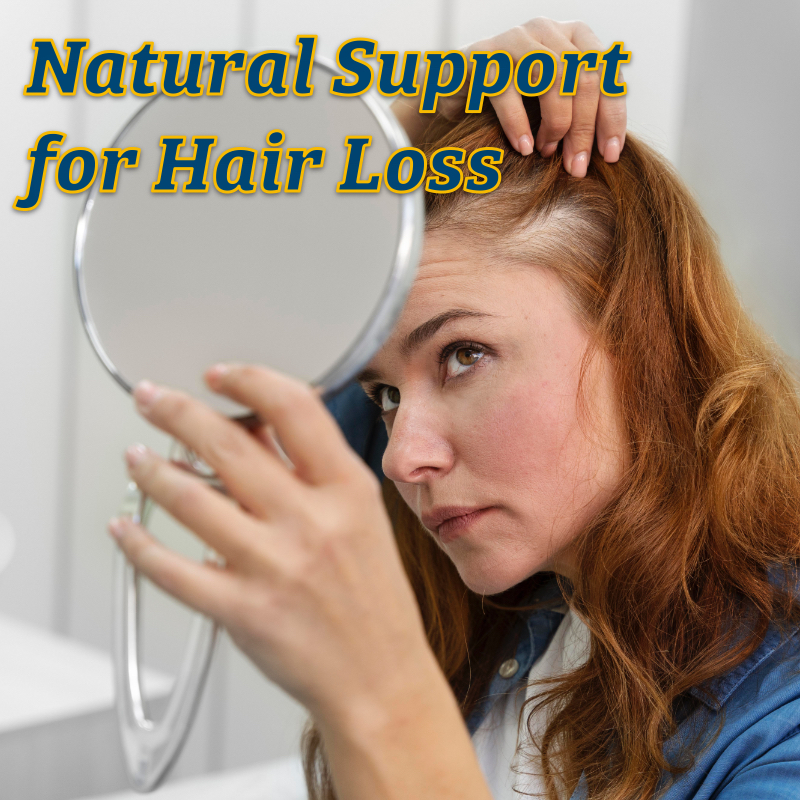Natural Support for Hair Loss
A Fresh Look at Hair Health
Could natural support for hair loss hold the key to better results with current treatments? A growing area of herbal hair loss support research is exploring how nutrients and plant extracts might enhance traditional approaches to thinning hair.
Androgenic alopecia—commonly known as pattern hair loss—is one of the most frequent causes of hair thinning in both men and women. It often appears gradually, starting with a receding hairline or thinning crown. Genetics and hormones play major roles, and while two FDA-approved drugs—minoxidil and finasteride—remain the standard treatments, their effectiveness varies widely.
Studies suggest that only about one in five people using these medications experience significant regrowth. Because of this, researchers continue to explore how nutrition and botanicals might complement existing therapies to help support overall results.

Inside the 2025 Study
A 2025 clinical investigation published in the Journal of Cosmetic Dermatology examined whether adding specific herbal extracts and nutrients could enhance the effects of traditional treatments.
The six-month study divided participants with androgenic alopecia into two groups:
Drug-only group: Participants used either minoxidil or finasteride.
Combination group: Participants used the same drugs plus a daily supplement containing:
320 mg Saw Palmetto Extract
320 mg Pumpkin Seed Extract
425 mg L-cystine
Vitamin C
Zinc
Researchers evaluated both visible outcomes and participant feedback to measure satisfaction and perceived hair improvement.
Herbal Hair Loss Support
The ingredients chosen for the study were based on existing data linking them to scalp and follicle support. Each component offers potential benefits to the structure and health of hair.
- Saw Palmetto (Serenoa repens): Often studied for its role in hormone-related pathways affecting hair follicles.
- Pumpkin Seed Extract: Rich in phytosterols and antioxidants that may help maintain a balanced scalp environment.
- L-Cystine: A building block of keratin, the primary protein that forms hair.
- Vitamin C: Supports collagen formation and helps protect against oxidative stress.
- Zinc: Important for tissue repair, cell growth, and maintaining scalp integrity.
This carefully balanced mix was designed to complement medication rather than replace it, supporting healthy scalp conditions while standard treatments addressed hormonal factors.
Notable Findings
After six months, researchers observed clear differences between the two groups. Those who combined supplements with standard medication showed greater improvement and higher satisfaction than those who used medication alone.
In the combination group, about one in three participants (36.5%) saw noticeable improvement in hair growth and thickness. In comparison, only about one in four (24%) in the drug-only group reported the same level of progress.
When participants were asked how satisfied they felt overall, nearly half of the supplement group (46%) described their results as great, compared to just 30% in the medication-only group.
Together, these findings suggest that participants taking both the supplements and medication experienced better results and greater satisfaction over the six-month period.
A Broader Perspective
This natural support for hair loss study contributes to a growing body of evidence that highlights the complementary role of nutrition and plant compounds in modern science. By merging conventional and natural approaches, researchers aim to address both the biological and nutritional sides of hair health.
It’s important to recognize that this was a six-month study with a limited sample size. Larger and longer-term research will help determine how these combinations work across different groups and over extended periods. Still, the outcomes provide encouraging insight into how herbal and nutritional approaches may strengthen the benefits of existing hair therapies.
Moving Toward an Integrative Model
As scientific understanding grows, studies like this support a more integrative view of wellness—one that sees the body as a system influenced by both medical and nutritional factors. Herbal hair loss support strategies can work alongside pharmaceutical options, potentially creating a more comprehensive approach to maintaining healthy hair.
This research reminds us that nature and science need not compete—they can work together. Combining carefully selected botanicals with established therapies may lead to a future where treatments are both effective and holistic.
For those seeking an all-natural path, many people explore traditional oils such as Batana Oil from Raw Actives, known for its deep conditioning properties and natural richness. It’s one of the pure, plant-based options available at Martindale’s Natural Market for those who prefer a simple, topical approach rooted in nature.
Reference:
Journal of Cosmetic Dermatology. 2025 Aug 25; 24(9):e70388.
Evaluation of Nutritional Supplementation on the Efficacy of Minoxidil and Finasteride in Androgenic Alopecia.
These statements have not been evaluated by the FDA. They are not intended to treat, diagnose, cure or prevent any disease.
